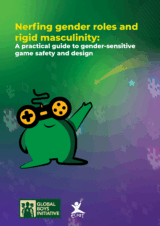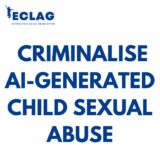ECPAT International contributes critical knowledge and evidence to inform advocacy and action against the sexual exploitation of children. Explore our research below.

Our purpose in creating this guidance is to provide insights and informed considerations for gaming companies to spark meaningful, collaborative conversations on approaching game safety with a gender-sensitive lens. This was developed with the intention of supporting adolescent boys, but the recommendations also contribute towards making games more gender-inclusive across the spectrum of identities.
Available in: English

Este Panorama de país de ECPAT sobre Venezuela incorpora las opiniones de doce informantes clave, entre ellos representantes de organizaciones de la sociedad civil dedicadas a la protección de la niñez y la adolescencia, organizaciones que apoyan a niñas, niños y adolescentes sobrevivientes y en contextos de migración, así como investigadores especializados en el tema.
Available in: Spanish

The case study, conducted with Defense for Children Palestine (DCIP) and SAWA Foundation in Palestine, provides critical support to boys affected by sexual violence across detention centres, displacement camps, and school communities.
Available in: English

ECPAT International, as part of the ECLAG coalition, has joined forces with DOT Europe to support the European Parliament’s position on the explicit criminalisation of AI-generated child sexual abuse material (CSAM) for personal use.
Together, we are urging the Council to uphold and adopt this critical position in the final text of the Recast Directive. The creation and possession of AI-generated CSAM, even without involving real children, fuels the demand for abusive material, normalises harmful behaviours, and contributes to the broader ecosystem of child sexual exploitation. Clear legislation is essential to close legal gaps and ensure that emerging technologies are not misused to facilitate harm against children.

In this study, ECPAT International and its partners explored the issue of technology-facilitated child sexual exploitation and sexual abuse through research aimed at documenting local knowledge and understanding of the issue in four West African countries, assessing practices and identifying localised responses. The results of this research were consolidated in four specific situational analyses.
Available in: English, French

In January 2025, ECPAT International and Jiyan Foundation for Human Rights organised a national workshop in Erbil, Iraq, to discuss the findings of a joint case study on child sexual exploitation in humanitarian contexts and propose survivor-centred responses. The study highlighted the stigma faced by survivors, the growing risks of child sexual exploitation in Iraq due to previous and ongoing crises, and the need for evidence-based advocacy to influence national and international actors.
Available in: English